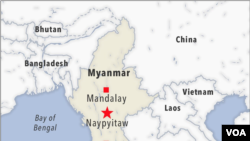Guns and ammunition bought under Thai police and army discount plans and siphoned into the black market have been seized by Thai customs on the Myanmar border, stoking fears of a new illicit arms trade driven by Myanmar’s post-coup collapse into chaos.
Myanmar’s army seized power from the civilian government Feb. 1, setting off a chain reaction of protests, bloody crackdowns and a revival of dormant conflicts with ethnic militias across the country.
As democracy activists flee to jungle camps to train in armed resistance, Thai border officials fear the conflict next door is spurring a cross-border gun trade.
On May 27 Thai customs seized 27 guns -- including pistols, semiautomatic M12s, M4 rifles and telescopic sights -- and 50,000 rounds of ammunition, in a truck attempting to cross into Myanmar at the Mae Sai border crossing in western Thailand.
“The majority of the seized guns are ‘welfare guns,’” Somsak Tangcharoentam, the Mae Sai customs director told VOA, referring to the so-called welfare guns list, a fluid online catalog of guns available to the police and military, and other government officials, at a discount.
“They’re guns that can be bought legally by government officers, police and soldiers, so their price is lower than the market value,” he said.
Thai customs officials arrested Kyaw Phoy, a Myanmar national, and Jam Namwong, who had a Thai identification card but who is a member of the Shan ethnic group, living on both sides of the border, according to a customs press release.
“This is the first time that we’ve found guns at the border, usually it’s only drugs and counterfeit goods,” Somsak said.
Although it does not manufacture its own weapons, Thailand is awash with guns.
A key route for weapons to reach the black market is the welfare list, which is aimed at law enforcement and other government officials, but loopholes allow the guns to seep into the black market, officials have told VOA.
“If you want to buy a rifle, all you have to say is that you’ll need it for sports. The deadlier the weapon, the harder obtaining the license is, but you can pay your way in,” an army captain said, requesting anonymity.
“These ‘welfare guns’ are mostly for war and conflict zones and they’re 30% to 70% cheaper than market price.”
Open borders
On March 28, border officials at Mae Sai seized over 100 hand grenades en route via courier to Tachileik, across the border in Myanmar.
Like the May gun haul, the shipment was found after random checks at an official border post in an area with a long, unpoliceable frontier with Myanmar.
“You can see the pattern,” a senior Thai police source at Mae Sai, also refusing to be named, said.
“It’s the second time in a few months and we’re worried this route might be used to fight the conflict in Myanmar,” he said.
Even before the coup, Myanmar’s borderlands were blistered by ethnic insurgencies, funded by drug trafficking and racketeering in ungovernable zones packed with casinos, prostitution and other illicit businesses.
The army’s unexpected February power grab has pitched Myanmar into chaos, fragmenting delicate alliances with rebel groups reigniting fighting between ethnic militias and the Tatmadaw, Myanmar’s military.
In addition, scores of young, urban protesters made desperate by the violence of Myanmar’s army, have headed to the jungle camps near the Thai border to undergo military training.
Their aim is to return to the cities, where peaceful protests have taken on an increasingly militant edge to fight back against soldiers who have been firing indiscriminately at demonstrators, killing, by best estimates, well over 800.
To fight Myanmar’s army, they will need a supply of weapons -- readily available from neighboring Thailand, where the coronavirus pandemic has crushed the economy.
“The crisis in Myanmar will almost certainly act to revive an arms black market in Thailand,” said Anthony Davis, a Bangkok-based security analyst for Jane’s Defense publications.
“Handguns for use in areas of urban conflict will be in great demand and given the depressed economic conditions that Thailand is now facing there will be no shortage of gun owners ready to sell weapons they are licensed to hold,” he said.
Meanwhile the “incentive” for government officials to sell licensed guns “onto the black market will be even greater,” he added.
Border officials in Mae Sai say they are stepping up patrols, but there is realistically little they can do to stop the supply, given the size of the border.
“We are under pressure” from Myanmar to stop the illegal cross-border arms trade, the police source in Mae Sai said, although there is a limit on what they can do.
“We’re on the border and we are separated by just a few meters and a shallow stretch of water,” the source said.





